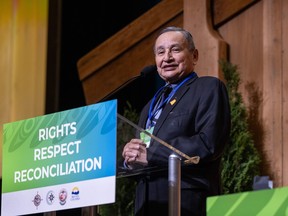Union of B.C. Indian Chiefs president Grand Chief Stewart Phillip offers apology for confusion, restates Northern Gateway is not on the table in any formula for dealing with threatened U.S. tariffs.

UBCIC president Grand Chief Stewart Phillip in a statement Wednesday said people need to plan for the possibility of the tariffs threatened by U.S. President Donald Trump.
However, “I do not support resuscitating dead projects such as the failed Northern Gateway pipeline, which would have been an absolute disaster for our lands and waters,” Phillip said.
“I sincerely apologize for any confusion,” Phillip added, with respect to his comments Tuesday that if Canada doesn’t “build that kind of infrastructure, Trump will and there will not be any consideration for the environment or the rule of law.”
Phillip said his answer was still no to “large-scale, destructive resource projects,” such as Northern Gateway.
UBCIC vice-president Chief Don Tom said Wednesday the organization will continue to focus on the implementation of “our inherent and constitutionally protected title and rights,” under B.C.’s legislation that defines government’s approach to the U.N. Declaration of the Rights of Indigenous Peoples Act.

“Any natural resource development that is being planned must have the consent of First Nations involved and must follow high environmental standards, including not increasing our greenhouse gas emissions and contributing to global warming,” Tom said.
Northern Gateway, which would have pumped 525,000 barrels of oil per day from Bruderheim, Alta., 1,200 km to Kitimat, was cancelled by Prime Minister Justin Trudeau’s government in 2016 along with its approval of the Trans Mountain Expansion pipeline project.
The pipeline company Enbridge then formally withdrew its application in 2017, but the project was also subject to B.C. Supreme Court and Federal Court rulings that government had failed to adequately consult with First Nations that would have to be resolved before proceeding.
Alberta Premier Danielle Smith, however, said this week that Canada needed to bring Northern Gateway and the abandoned Energy East pipelines to “immediately start,” diversifying the country’s export trade to “stop being so reliant on a single trading partner.”
Premier David Eby, speaking Tuesday, said “without question, diversification has to be part of our key strategy,” but skirted a direct mention of Northern Gateway by pointing out “I have some differences of opinion with Premier Smith.”
When advancing proposals, Eby said “it is critically important,” whatever provinces they cross, that decisions involve Indigenous communities, provincial and federal governments.
However, Eby said “it feels a bit speculative” to talk about Northern Gateway.
B.C. Conservative Leader John Rustad agreed that B.C. needs to do a better job facilitating the flow of energy to B.C.’s coast as a step toward increasing exports to countries other than the U.S., but Northern Gateway wouldn’t be the best project to do that.
Rustad, the MLA for Nechako-Lakes, said there are lots of people with legitimate concerns about the impact the project could have on the Fraser and Skeena watersheds.
However, Rustad believes Ottawa needs to work with the provinces on a Canada-wide free-trade agreement and look at renewing Confederation to rebalance the power of the federal government in relation to provinces and territories.
“Canada doesn’t really have a good sense of who it is as a nation. It’s easier for us here in British Columbia, for example, to do trade with the United States than to trade with other provinces,” he said.
“It’s time we actually started treating ourselves as a country, opening up the opportunity for movement of goods, including energy, across this country.”
Rustad added that the province needs to work with First Nations on other economic opportunities that help strengthen the country and make Canada less reliant on the U.S.
Green MLA Rob Botterell said B.C. would be better off “moving away from oil and gas development and moving much more aggressively toward renewable energy,” and that Trump made the U.S. an outlier in the world when it comes to the energy transition.
“From our perspective, given the accelerating climate change and the imperative of respecting Indigenous rights through frameworks like the Declaration on the Rights of Indigenous Peoples Act, we shouldn’t be looking at resurrecting pipeline proposals,” he said.
Botterell said he was glad to see Phillip walk back his comments and that the Greens are looking forward to working with the NDP on a review of the CleanBC plan over the coming year, which is a key part of the Cooperation and Responsible Government Accord his party signed with the government in December.
With files from The Canadian Press